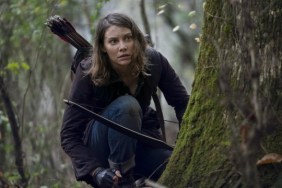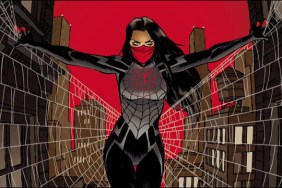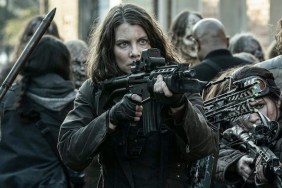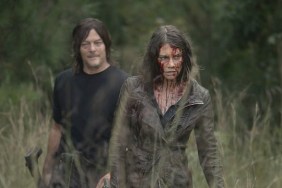In a long, gold filigree ballroom at the San Diego Hilton, the lights are dimming and the Fear the Walking Dead Comic-Con trailer is playing (watch it below!). The cast runs through the hills of Mexico in a preview of the second half of Season 3 (airing September 10 on AMC) trying desperately to make a deal with the antagonistic Black Hat reservation introduced in the first half. And for the first time since the end of season two, the main cast is back together as team mom Madison (Kim Dickens) heads out into the wild to reunite with Daniel Salazar (Ruben Blades) and Victor Strand (Coleman Domingo). Not everyone in the reunion looks happy.
Then lights come up and the cast of Fear the Walking Dead (minus Blades and the departed Cliff Curtis but with new stars Daniel Sahrman and Sam Underwood) replaces their video counterparts, joined by series show runner Dave Erickson. In a lot of ways they seem very much like their characters on the show (though less grimy), particularly Frank Dillane who sports even wilder, more mussed hair than Nick Clark and who refuses to speak the entire time.
Q: We saw just now many of the original cast coming back together, has there been any change in the characters and how they relate? For instance with Madison and Strand coming back together?
Dickens: What did you see?
Domingo: Were we getting along?
Dickens: We have such a good time working together, it was great to get to do it again. It was surprising the way they got back together.
Domingo: We’re up to our old hijinks.
Q: Have those relationships changed any? How have the characters, the original ones, evolved?
Dickens: Madison has become more merciless. At first she was probably a merciless high school counselor but really beholden to morality. By Season 3 she realizes the new currency is brutality. Her main goal is to survive and protect her family.
Domingo: What I loved was Strand was initially a mysterious man of means and Season 2 was all about his deconstruction and the deconstruction of western civilization in many ways. Every so often I was confused on what I was doing and would call Dave [Erickson] up, but that’s the great journey for this man. Season 3 is about emerging into a new man, to take the skills he knew and rebuild on them, to survive because that’s what he is. A survivor.

Mason [Ophelia]: When we met Ophelia she was daddy’s little girl but the moment she was orphaned she became stronger. The beauty is we see now how much like her father she is becoming and now that we know Daniel is alive, I love the idea of them meeting again and seeing how they will fare together. Hopefully he recognizes her when he sees her.
Domingo: I put together a collage looking at the way we evolved from Season 1 to now. We were just human beings and now we have scavenged and taken what we needed and become something else. I love that our audience is responding to that. We want to be our own organism.
Debnam-Carey [Alicia]: What’s so wonderful is our cast is very, very tight. We all do really get along well and for us to come from Season 1 and get to add people and kind of keep them… we’ve been able to bond. And our locations have been quite remote this year, so we’ve had to entertain each other.
Underwood: And the social zeitgeist in the world is like a zombie apocalypse right now and being able to band together like a family is when things are so stressful right now.
Callie [Jeremiah]: Obviously they were floundering till I got there. I was the example. It felt good.
[cue copious good natured eye rolling from the rest of the cast]
Q: You mentioned the remote location… how has that worked into this season, going from LA in Season 1 to the boat in Season 2 to Mexico for Season 3? How did you decide that’s the direction you wanted?
Erickson: It was sort of a build starting last season, a lot of what went on in Season 2 was to set up for it. Thematically a lot of Season 3 is about resources and appropriation and re-appropriation. The apocalypse has wiped away existing borders.
Greyeyes [Walker]: This is a world where the old rules are broken and what emerges are our base instincts. What we need to do to ensure our survival. I’ve described it as the return of feudalism; Fear has always been a show which pushed those boundaries.

Q: As much as they’ve changed they’re still doing the same things, still looking for a place to settle down, put down roots…
Domingo: They’re constantly going to this new place and saying we’ll build here and it falls down. We said that at the hotel and saw how that went.
Dickens: That’s the human spirit.
Mason: And it’s exciting for fans. I remember watching Walking Dead when they were stuck wandering for a while and we were all ‘come on!’
Greyeyes: And it raises tension in the narrative. It presses on the nerves of the audience.
Sharman: The challenging thing is to make something real about the situation. What’s so good about thee show is that, outside the premise that we’re saying there is a zombie apocalypse, that’s not what it’s about. It’s a specific and well made investigation into what it is to be human. There isn’t a character on the show who is black and white. It gets a lot more interesting for Troy as we get to the end of the season, as you’ll see.
Q: There is an interesting dynamic going on between Troy and Jake, almost Caine and Able.
Calliee: They’re draining [laughter]; pains in the ass, can’t do anything they’re told. It’s just wearing the sh*t out of me.
Debnam-Carey: You love it.
Underwood: I think this idea of Nick connecting to Troy and Alicia to Jake makes an interesting thing, the struggle for power. Caine and Able has definitely come up, so has Of Mice and Men.
Sharman: I do have a brother and there’s something about that sibling relationship which makes me emotional. There’s something that is interesting to explore, especially when they’re so different. They do family well.
[Dillane laughs]
Debnam-Carey: What are you laughing about? I love working on sibling scenes. We rarely get to do them. Frank is one of my favorite people to work with and it’s always a treat when we get to.

Q: You mentioned an interesting journey for Troy coming up in the second half of the season, can you elaborate?
Sharman: The first part of the next half is Troy figuring out – he knows something is up. There’s an investigation.
Callie: Frank. Frank. Frank.
Sharman: Thanks Dayton. So the first half is figuring that out and then does he have the ability to assume the throne.
Debnam-Carey: By the end of this half the family is involved in this murder cover up. That starts to divide them and that’s great for Alicia because we see her stake out her own path. I’m looking forward to that. That fact that I find out what Nick did…
[Dillane reacts with surprise and incomprehnsion]
Debnam-Carey: Have you not read the scripts? They’re really good. There’s a whole difference of opinion between what’s right and wrong.
Dillane: I don’t know. I have no idea what the second half will be like. I use a knife a lot.
Callie: I don’t know this, but I think the camp is going to go to hell without me.
Q: The main show after seven seasons has been a lot about survivalism and community survival surrounding a core group – will your core group get back together and stick together?
Erickson: There are two answers to that. The first is I don’t know. It’s really in someone else’s hands right now, however Scott and Robert want to move forward. We intentionally sent everyone out an apart at the end of Season 2 and now the story is about bringing them back and that’s difficult to do in an organic way. The show has been under a microscope since it started and embracing that and making a different show — we have the same rules but are tonally distinctive — one of the great things about this season in particular is it has evolved into its own thing. I like to think some of the comparisons have fallen away to an extent.
Domingo: Please give a round of applause to our showrunner, Dave Erickson.
Fear the Walking Dead Season 3
-
Fear the Walking Dead Season 3

Alycia Debnam-Carey as Alicia Clark - Fear the Walking Dead _ Season 3, Episode 1 - Photo Credit: Michael Desmond/AMC
-
Fear the Walking Dead Season 3

Kim Dickens as Madison Clark, Cliff Curtis as Travis Manawa - Fear the Walking Dead _ Season 3, Episode 1 - Photo Credit: Michael Desmond/AMC
-
Fear the Walking Dead Season 3

Sam Underwood as Jake Otto, Lindsay Pulsipher as Charlene - Fear the Walking Dead _ Season 3, Episode 1 - Photo Credit: Michael Desmond/AMC
-
Fear the Walking Dead Season 3

Frank Dillane as Nick Clark, Danay Garcia as Luciana - Fear the Walking Dead _ Season 3, Episode 1 - Photo Credit: Michael Desmond/AMC
-
Fear the Walking Dead Season 3

Colman Domingo as Victor Strand - Fear the Walking Dead _ Season 3, Episode 2 - Photo Credit: Michael Desmond/AMC
-
Fear the Walking Dead Season 3

Colman Domingo as Victor Strand, Karen Bethzabe as Elena - Fear the Walking Dead _ Season 3, Episode 2 - Photo Credit: Michael Desmond/AMC
-
Fear the Walking Dead Season 3

Mercedes Mason as Ofelia Salazar- Fear the Walking Dead _ Season 3 - Photo Credit: Richard Foreman, Jr/AMC
-
Fear the Walking Dead Season 3




